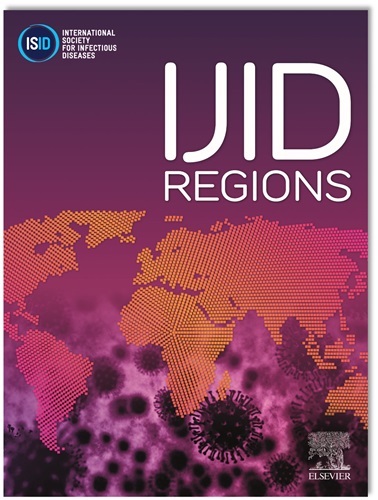Global dengue epidemic worsens with record 14 million cases and 9000 deaths reported in 2024
IF 4.8
2区 医学
Q1 INFECTIOUS DISEASES
引用次数: 0
Abstract
Dengue, caused by the dengue virus (DENV), is the fastest-growing mosquito-borne disease worldwide. We utilised monthly data on dengue cases and deaths reported through the World Health Organisation's (WHO) global surveillance system for the period of 1st January to 31st December 2024. We then performed a generalised linear regression model to understand country-level determinants of dengue-related mortality. In 2024, 14.1 million dengue cases were reported globally, surpassing the historic milestone of 7 million observed in 2023. This figure represents a twofold increase compared to 2023 and a 12-fold rise compared to 2014 (n=1,206,644). In 2024, 9,508 dengue-related deaths were recorded, resulting in a global case-fatality rate of 0.07%. In the regression analysis, countries in the Southern hemisphere (incidence rate ratio [IRR]: 5.95, 95% CI: 4.19-8.46), aged population (IRR 1.04, CI: 1.01-1.07), and mean annual temperature (IRR 1.21, CI: 1.16-1.26) were significantly associated with higher dengue-related mortality per million population. The ongoing dengue outbreak underscores the urgent need for global investment in DENV research, vaccine development, vector control, and therapeutic strategies. We urge the inclusion of DENV in the WHO’s Research and Development Priority Disease list to address this growing global health threat.
全球登革热疫情恶化,2024年报告了创纪录的1400万病例和9000人死亡。
登革热由登革热病毒(DENV)引起,是世界范围内增长最快的蚊媒疾病。我们利用了2024年1月1日至12月31日期间通过世界卫生组织(WHO)全球监测系统报告的登革热病例和死亡的月度数据。然后,我们进行了广义线性回归模型,以了解国家层面的登革热相关死亡率决定因素。2024年,全球报告了1410万登革热病例,超过了2023年观察到的700万例的历史里程碑。这一数字比2023年增加了2倍,比2014年增加了12倍(n= 1206644)。2024年,记录了9508例与登革热有关的死亡,导致全球病死率为0.07%。在回归分析中,南半球国家(发病率比[IRR]: 5.95, 95% CI: 4.19-8.46)、老年人口(IRR: 1.04, CI: 1.01-1.07)和年平均气温(IRR: 1.21, CI: 1.16-1.26)与每百万人中较高的登革热相关死亡率显著相关。目前的登革热疫情突出表明,迫切需要在登革热研究、疫苗开发、病媒控制和治疗战略方面进行全球投资。我们敦促将DENV列入世卫组织的研究与开发重点疾病清单,以应对这一日益严重的全球健康威胁。
本文章由计算机程序翻译,如有差异,请以英文原文为准。
求助全文
约1分钟内获得全文
求助全文
来源期刊
CiteScore
18.90
自引率
2.40%
发文量
1020
审稿时长
30 days
期刊介绍:
International Journal of Infectious Diseases (IJID)
Publisher: International Society for Infectious Diseases
Publication Frequency: Monthly
Type: Peer-reviewed, Open Access
Scope:
Publishes original clinical and laboratory-based research.
Reports clinical trials, reviews, and some case reports.
Focuses on epidemiology, clinical diagnosis, treatment, and control of infectious diseases.
Emphasizes diseases common in under-resourced countries.

 求助内容:
求助内容: 应助结果提醒方式:
应助结果提醒方式:


